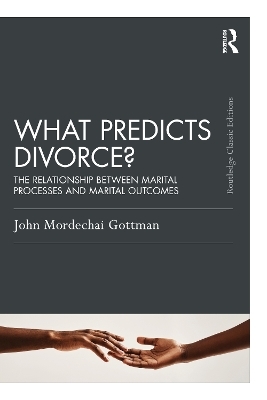
What Predicts Divorce?
Routledge (Verlag)
978-1-032-53937-9 (ISBN)
In its original volume, first published in 1993, John Gottman details years of research involving questionnaires and observations of married couples in pursuit of the determinants of both marital happiness and divorce. Grounded in science and informed by clinical practice, it offers psychological professional insight and awareness of what healthy relationships need.
With a new preface by the Gottman Institute Clinical Director, Dr Don Cole, and Research Director, Dr Carrie Cole, this Classic Edition of the landmark text, What Predicts Divorce?, reveals to a new generation, the original context of Gottman’s work, how he has further developed his research and thinking, and the ongoing relevance of this volume in the context of future challenges for the field.
Providing a roadmap that gives shape to the science yet to be done, this Classic Edition of What Predicts Divorce? is essential reading for all family and clinical psychologists, as well as therapists working with couples in relationship counselling.
John Mordecai Gottman is an American psychological researcher and clinician who did extensive work over four decades on divorce prediction and marital stability. He is known for his work on marital stability and relationship analysis through scientific direct observations, many of which were published in peer-reviewed literature. Gottman is a professor emeritus of psychology at the University of Washington. Dr. John Gottman and Dr. Julie Schwartz Gottman co-founded and lead a relationship company and therapist training entity called The Gottman Institute.
Foreword Preface 1 Introduction 2 What Makes Some Marriages Magical and Some Miserable? Raising the Questions 3 Terman's Question: What Makes for Marital Happiness? The View From Observational Methods 4 Longitudinal Change in Marital Happiness: Observing Physiology as Well as Marital Interaction 5 Marital Processes That Predict Dissolution 6 In What Sense Are Regulated Couples Regulated? 7 Is Conflict Avoidance Dysfunctional? 8 Conflict Avoidance and the Behavior of the Listener: Toward a Typology of Marriage 9 There Are Two Types of Conflict Engagers 10 A Balance Theory of Marriage 11 There Are Two Types of Nonregulated Couples 12 Male Withdrawal From Marital Conflict 13 Replication and Extension 14 Physiology During Marital Interaction 15 Toward a Comprehensive Theory of Marital Stability 16 Eight-Year Longitudinal Follow-Up Study 17 Recommendations for a Stable Marriage 18 Epilogue. Appendix: The Observational Coding Systems.
| Erscheinungsdatum | 13.09.2023 |
|---|---|
| Reihe/Serie | Psychology Press & Routledge Classic Editions |
| Zusatzinfo | 83 Tables, black and white |
| Verlagsort | London |
| Sprache | englisch |
| Maße | 156 x 234 mm |
| Gewicht | 440 g |
| Themenwelt | Geisteswissenschaften ► Psychologie ► Allgemeine Psychologie |
| Geisteswissenschaften ► Psychologie ► Entwicklungspsychologie | |
| Geisteswissenschaften ► Psychologie ► Familien- / Systemische Therapie | |
| Geisteswissenschaften ► Psychologie ► Psychoanalyse / Tiefenpsychologie | |
| Medizin / Pharmazie ► Gesundheitsfachberufe | |
| ISBN-10 | 1-032-53937-2 / 1032539372 |
| ISBN-13 | 978-1-032-53937-9 / 9781032539379 |
| Zustand | Neuware |
| Informationen gemäß Produktsicherheitsverordnung (GPSR) | |
| Haben Sie eine Frage zum Produkt? |
aus dem Bereich


